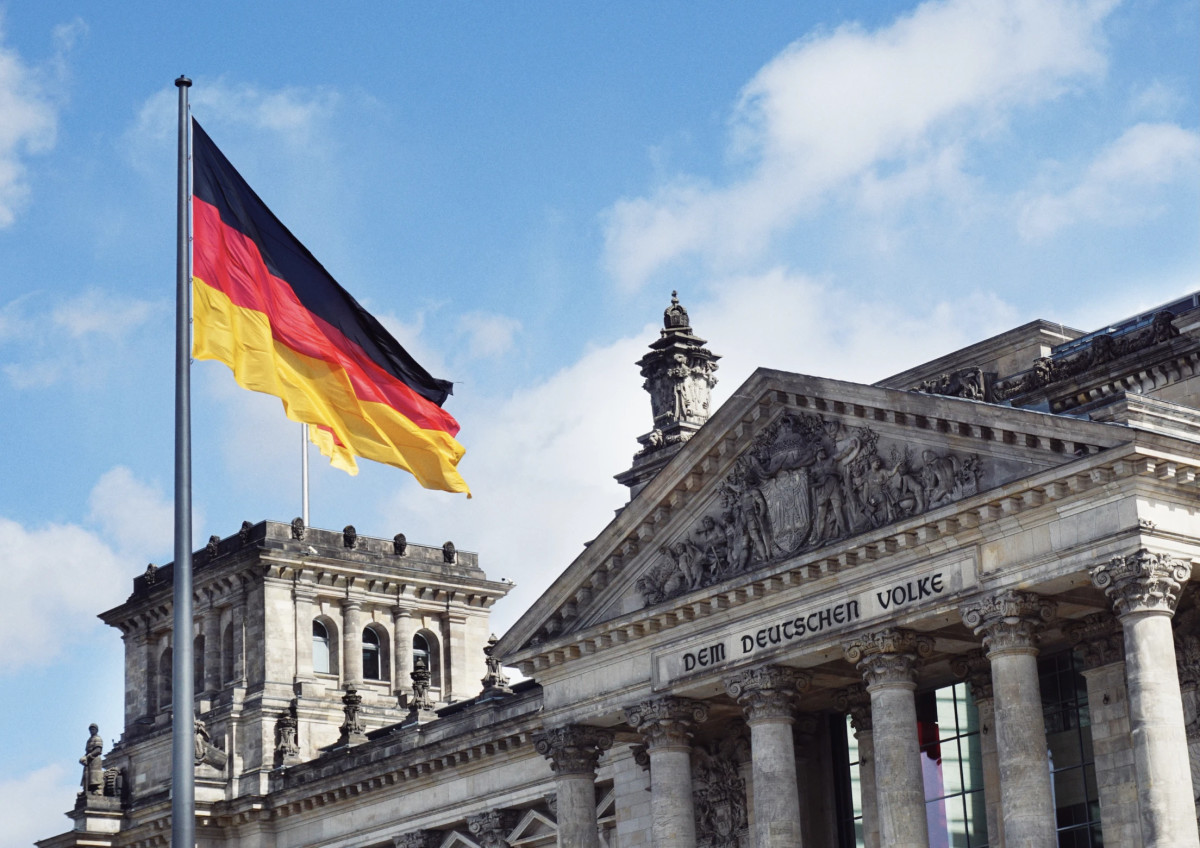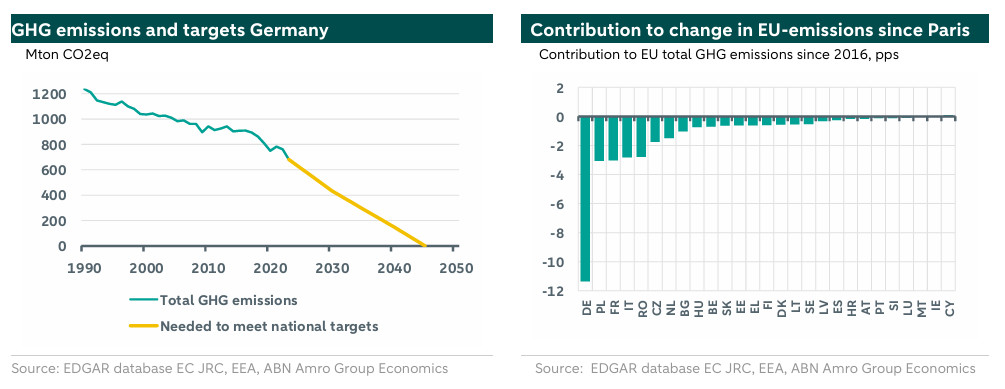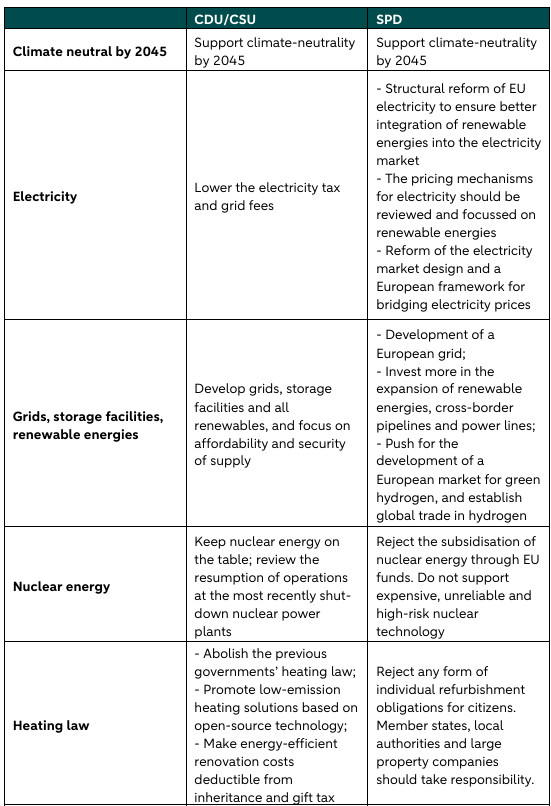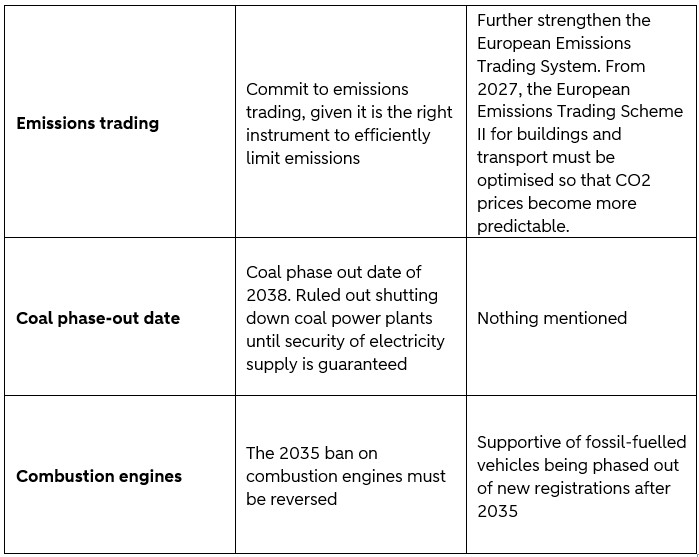ESG Economist - German election result to slow down but not derail climate policy


The next German coalition government will likely include the CDU/CSU and the SPD, reviving the famous GroKo (Grand Coalition), and following on the heels of what was considered as one of the most “climate ambitious governments” in the world.
Although both parties support achieving climate-neutrality by 2045, their manifestos highlight some differences in how they intend to get there.
While CDU/CSU is supportive of nuclear energy, SPD promptly rejects nuclear energy, considering it an “expensive, unreliable, high-risk” technology
With regards the Building Energy Act, which was amended by the end of 2023, CDU/CSU reiterates its intention to abolish it
Nevertheless, the two parties agree on some matters, such as the development of grid, storage facilities and renewable energies. As well as strengthening the European Emissions Trading System
The recent-announced reforms to Germany’s debt brake need support from two-thirds of the parliament. The Greens are likely to support those changes as long funds are also directed towards green projects
All in all, we do not expect any substantial shift in the direction of climate and energy policies, though some measures may slow the pace compared to previous ambitions
On 23 February, federal elections were held in Germany, following the premature collapse of the incumbent governing coalition. As mentioned in , the CDU/CSU led by Friedrich Merz has won the election, putting the party in the driver’s seat for the coalition talks. The next coalition will likely include the CDU/CSU and the SPD, reviving the famous Groko (Grand Coalition). The new coalition will nevertheless follows on the heels of what was considered one of the most “climate-ambitious” governments in the world Hence, and as we approach the deadlines for the first climate targets, it is worth considering what will a new government mean to Germany’s climate ambitions.
Parties are supportive of being climate-neutral by 2045
Climate and energy policies in Germany are unlikely to see a substantial shift in key areas under the most likely coalition scenarios. For instance, the parties set to form a new government stand by the country’s 2045 climate neutrality target, which is more ambitious than those set by the EU. Moreover, intermediate targets are set of a reduction in Greenhouse gas (GHG) emissions by at least 65% by 2030 and by at least 88% by 2040. According to the renowned independent Climate Action Tracker (CAT), Germany’s 2030 emissions reduction target based on current policies and actions is “Almost sufficient” when compared to modelled emissions pathways, and consistent with 2°C of global warming. CAT projects that implemented policies and actions will lead to emissions reductions of between 62-64% below 1990, which is somewhat less than the 65% target. Having said that, Germany currently still is the EU’s largest emitter, with a share of more than 21% in the EU total in 2023 (followed at a distance by France 12%, Italy 12% and Poland 11%). Germany has contributed 11.4pps to the total 34% reduction in total EU GHG emissions since the Paris Agreement, which became effective in 2016.
But…how do parties intend to achieve that?
Although the parties agree on the targets, the next coalition government’s composition still could have a palpable effect on the speed and ambition with which further energy transition and decarbonisation measures are implemented, and how Germany positions itself in EU climate policy.
Home heating has emerged as a major political issue in Germany. Alongside transport, the building sector has frequently failed to meet its decarbonization targets, prompting the outgoing coalition government to act. Towards the end of 2023, the German parliament amended the Building Energy Act, requiring newly installed heating systems to be powered by at least 65% renewable energy. This includes heat pumps, "hydrogen-ready" gas boilers, and other low-carbon systems. The law is designed to be phased in gradually across different regions and home types, starting with new constructions. The amendment was less stringent than the coalition's initial proposal, allowing for extended use of gas boilers. Election manifestos highlight differing positions on this topic, with the CDU indicating that it would abolish the previous governments’ heating law (). Despite the building sector being responsible for 15% of Germany’s total GHG emissions, it has, along with transport, achieved relatively modest reductions in emissions. Such that, reversing the Building Energy Act could further slowdown the sector’s progress in cutting emissions.
Another area of contention between the parties is nuclear energy. The CDU/CSU supports nuclear energy development and seeks to reconsider the reactivation of recently closed nuclear power plants, whereas the incumbent SPD opposes using taxpayer money for what they deem an "unreliable, expensive, and high-risk" technology .
Furthermore, the EU’s planned phase-out of combustion engines by 2035 is a point of contention between the two parties. While the CDU/CSU seeks to reverse the ban on combustion engine vehicles, SPD supports the phase-out, viewing it as a crucial measure for achieving climate protection targets.
Despite these differences, the parties do agree on certain issues. Both advocate for increased investment in expanding renewable energies and developing grid and storage facilities. Additionally, CDU/CSU and SPD both support strengthening the European Emissions Trading System, although they differ on the system's role in achieving climate targets.
Below, we compare the positions of the two parties on various issues.
Furthermore, Germany announced transformative reforms to its debt brake last week (read more about it here). The key announcements included: 1) the establishment of a EUR 500 billion infrastructure fund, 2) exempting defence spending above 1% of GDP from the debt brake, and 3) allowing German Länder to borrow up to 0.35% of GDP, up from previously zero. However, the CDU/CSU requires a supermajority of two-thirds in parliament, including support from the Green Party, to approve these changes. As noted by the Financial Times, Green officials are advocating for a more comprehensive reform of the debt brake, a wider strategy to revamp Germany's defence and security, and increased funding for climate protection and the green transition. Therefore, we anticipate the Greens will seek concessions to ensure greater focus and funding for Germany's transition.
Conclusion
In conclusion, the outcome of the recent federal elections in Germany and the formation of a new coalition government marks a significant moment for the country's climate and energy policies. The potential revival of the Grand Coalition suggests that Germany's ambitious climate targets, including achieving climate neutrality by 2045, will remain a focal point. However, the composition of the coalition could influence the pace and ambition of implementing these measures, particularly in areas such as home heating, nuclear energy, and emissions trading.
Despite some policy disagreements, notably on nuclear energy and heating laws, both parties agree on the need for increased investment in renewable energies and grid development, as well as the strengthening of the European Emissions Trading System. The recent reforms to Germany's debt brake and the infrastructure fund indicate a willingness to invest in transformative changes, although achieving consensus with the Green Party will be essential for approval.
Ultimately, while the new coalition presents challenges, it also offers opportunities for Germany to assert its leadership in climate policy within the EU. The coming months will be crucial in determining how effectively the new government can balance these priorities, navigate political differences, and drive progress towards Germany's climate ambitions.


